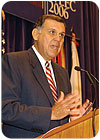
WASHINGTON - Energy certainly has been a top-of-mind issue in recent years and the World Energy Engineering Congress (WEEC) provides a comprehensive look at multiple aspects of this important topic. The opening session of this year's conference focused on leadership in energy management and was led off by two United States senators.
"In America, our overdependence on foreign oil has made our country less energy secure," said Sen. Mel Martinez (R-Fla.). He stated that we need to pursue a multifaceted solution to energy policy that includes more domestic production, more conservation, and more use of alternative fuels.

"It is important to remember that high oil and natural gas prices are not a Republican or a Democrat issue," he said. "They are really a national problem."
Conservation is also essential because it helps to reduce consumption. "We need to contribute all we can to conservation," said Martinez.
One of the most exciting areas in energy is the development of alternative fuels, such as ethanol, he said. We have broken ground recently on 35 new ethanol plants, which is helping to revitalize our rural economies, he noted.

The passage of the Energy Policy Act of 2005, he said, gives homeowners tax credits, gives home builders tax credits, and provides tax incentives to commercial builders for applying energy efficient measures. With all these initiatives, "The rising cost of fuel is a problem that can be corrected."
Sen. Byron Dorgan (D-N.D.) noted that there are substantial deposits of oil overseas while there is substantial demand here in the United States. "We suck out of the earth about 84 million barrels of oil a day. We use 21 million barrels of it right here in the United States - one-fourth of it," he said.
Sixty percent of the oil we use comes from outside our country, "much of it from troubled parts of the world." Does that leave us hostage to events we can't control, he asked. "You're darned right it does," he affirmed.
There are four components of the recent energy bill that address this problem. "It's pretty good. It's not breathtaking, but it's not bad," he said.
Number one is to increase supply. Dorgan stated that he's against drilling in ANWR. He believes that it should be a last resort and that the United States should open the Gulf area first because there are significant resources there.
Dorgan also believes that we can use our vast deposits of coal without despoiling the environment through the development of coal gasification and zero emission coal plants.
The second element of the energy bill is conservation. "Conservation is the cheapest form of acquiring new energy," he said. We waste so much energy in this country, he proclaimed, "it's almost unbelievable."
The third component of the energy act is renewable energy. This includes biomass, wind energy, solar power, and fuel cells. Dorgan supports getting 10 percent of our electric energy from renewables. "We can do it," he said.
He is very high on fuel cells. He noted that we currently have $3.75 billion in the federal budget over five years devoted to a long-term look at fuel cells. "We can be much bolder than that," Dorgan said.
We need a mix of new energy to make us less dependent on foreign oil, he asserted. "We're not going to drill and dig our way out of this problem."
The fourth element of the energy bill deals with energy efficiency. For example, he stated, "The SEER 13 standard for air conditioners is really, really important." These four areas in combination constitute our energy policy, Dorgan said, but we must also pursue new ideas, new technologies, and new opportunities within these areas.

IMPLEMENTING THE ENERGY ACT
Get Moy, Ph.D., P.E., director of Utilities & Energy, Office of the Deputy Under Secretary of Defense, Installations & Environment, discussed how the Department of Defense (DOD) is implementing the Energy Policy Act of 2005.Moy said the goal of the DOD is not just achieving the minimum in applying energy efficiency, demand reduction, and other measures, but taking a comprehensive, maximum-return approach.
The DOD has over 570,000 buildings, he said, and has installation support budgeted at over $48 billion for 2007. It is the nation's single largest energy user, making up 78 percent of federal energy use and 1 percent of total U.S. energy use.
The department has a goal of reducing standard building consumption by 30 percent. It has achieved 28.3 percent as of fiscal year 2005. The department has increased the use of energy-savings performance contracts and is "exploring more use of solar technologies," said Moy. It is also looking at increased implementation of fuel cells.
Energy conservation investment has been steadily increasing, Moy remarked, and initiatives include an aggressive goal of "25 percent of consumption from renewable energy by 2025."
Kathleen Hogan, Ph.D., director, Climate Protection Division, U.S. Environmental Protection Agency (EPA), then talked about leadership through Energy Star.
Hogan said, "Studies show that energy efficiency can help control electricity demand cost effectively by more than 50 percent over the next decade or so. And it can substantially offset natural gas demand and help lower energy prices." However, energy efficiency is "critically underutilized across the country."
We need leadership from business "to make efficient energy use a management priority," she said. The Energy Star program has been very successful, she noted, bringing savings of $12 billion in 2005 alone. But, "based on the potential out there, this is really just the beginning."
Commercial building energy use can be significantly reduced, said Hogan. Energy Star provides the framework for achieving savings. More than 28,000 buildings have been rated using the Energy Star system, she said. To date, almost 3,000 high-performing commercial buildings have earned the Energy Star label. These buildings use about 40 percent less energy than typical buildings.
Now, industrial plants can also earn the Energy Star label, and Hogan used the occasion to announce the initial facilities to be awarded this designation.

ENERGY MANAGEMENT IS VITAL
Shirley Hansen, Ph.D., CEO of Hansen Associates, said that energy management needs to be viewed at the international, national, state, and local level.When it comes to energy supply, she said, "We have failed miserably in the last 30 years to meet our needs." In 1973, we imported 26 percent of our oil, she said. Today we are importing nearly 60 percent. She noted, "We have restricted our supplies, yet we complain about the price." For example, she said, take ANWR. What do we really know about this region? What do we know about whether we can drill there responsibly?
When you look at "big oil," Saudi Aramco is many times bigger than Exxon Mobil, said Hansen. The control of the world's oil is in the hands of national oil companies, such as the Saudi Arabian and Iranian oil firms. "Seventy percent of the world's oil is in countries we consider unstable," she said.
Hansen then asked: What is the price we are willing to pay to not drill in ANWR? What is the price we are willing to pay to shy away from offshore drilling?
The best single source we have for energy right now is energy efficiency, she said, but we must also carefully manage our energy supply. We must not wait until we are in a panic situation and then drill without proper energy management and do irreparable harm.
"Energy managers are the most underutilized, overlooked members of the energy equation," Hansen stated. "And the key to revitalizing our energy industry is our energy management at all levels."
Publication date: 10/16/2006


Report Abusive Comment